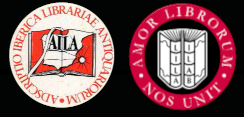


Home |
Temáticas |
Catálogos |
Pedidos |
  |  |
|||||||
|

|
RUGENDAS. (Johann Moritz) HABITANTE DE GOYAS, QUADRO A ÓLEO PINTADO SOBRE MADEIRA. |
|
|
Clique nas imagens para aumentar. CASTRO. (Alfonso de) ADUERSUS OMNES HAERESES. LIBRI XIIII.Fratris ALPHONSI DE CASTRO, Zamorensis, Ordinis Minorvm, Aduersus omnes Haereses, Libri XIIII. Indicem rerum praecipuarum in calce reperies. Lvgdvni, Apvd Antonium Vincentivm. 1546 [Colofon]: Lugdvni, EXCVDBANT IOANNES ET FRANCISCVS FRELLONII. FRATRES. ANNO M. D. XLVI. [1546]. In 8º de 16x10,5 com [xvi], 882, [xxx] págs. Encadernação da época com belos ferros a seco rolados nas pastas formando esquadrias decoradas com motivos vegetalistas e volutas e um losango ao centro, e com nervos e rótulos vermelhos na lombada. Folha de rosto ilustrada com a marca do editor, António Vicente. Impressão muito nítida em pequenos caracteres redondos, alguns caracteres itálicos nas páginas preliminares e nas citações ornamentada com iniciais decoradas no início dos capítulos. Exemplar com a lombada espelhada sobre moderno restauro profissional, com rótulos vermelhos modernos reproduzindo os originais da época e com vestígios do local dos fechos da encadernação. Com anotações coevas na folha de guarda anterior que está quase solta, com assinatura de posse coeva na folha de rosto, de .... M [anu]el Coelho; com reforços nas margens das duas primeiras folhas e com o início de um índice temático manuscrito que inclui as letras a, b, e uma palavra da letra c, na frente da folha de guarda posterior. Com minúsculo pico de traça no festo desde a quinta folha preliminar até à página 294. As páginas preliminares contêm: [Prólogo] ao leitor; índice de todas as heresias; Dedicatória ao Cardeal D. João Tavera, Arcebispo de Toledo; e carta de Frei Francisco Meneses ao autor. As primeiras 7 páginas numeradas contêm um prefácio do autor. As trinta páginas finais incluem um índice de assuntos 5.ª Edição muito rara. A BNF não tem exemplares catalogados desta edição. A primeira edição foi publicada em Paris, no ano de 1534, a segunda, em Salamanca, no ano de 1541, a terceira e a quarta, em Paris, no ano de 1543. Foram publicadas muitas mais edições por toda a Europa no século XVI. Obra muito influente no pensamento teológico do século XVI e XVII, que reflecte as posições dos teólogos espanhóis que influenciaram o Concílio de Trento. O autor descreve todos os desvios da fé, do ponto de vista da Igreja Católica, que apareceram desde a morte de Cristo até há data da publicação da obra, incluindo já diversas tendências protestantes, como o Luteranismo e o Calvinismo. Recorrendo a uma vasta erudição e conhecimento das Escrituras, refuta as doutrinas que contesta e são condenadas, pela Igreja. É uma extensa e muito completa enciclopédia e um manual para o estudo e contestação das heresias. Nela o autor defende também a proibição das traduções da bíblia em línguas vulgares, com receio de que tal levasse a interpretações erradas do texto bíblico. No entanto, esta posição não foi acolhida no Decreto final do Concílio de Trento, de Abril de 1546, sobre as Sagradas Escrituras. Fr. Alfonso de Castro (Zamora, 1495?, - Bruxelas, 1558) Franciscano. Teólogo, professor de teologia na Universidade de Salamanca, teve participação destacada no Concílio de Trento. Foi célebre pregador, na Alemanha, Inglaterra e Países Baixos. Chegou a ser nomeado Bispo de Compostela, em 1557, mas não chegou a entrar na sua diocese por falecer. Foi autor de outras obras, entre elas: In Psalmum L. Miserere mei Deus.Homiliae XXV. 1537; De justa haereticorum punitione libri tres, 1547; De potestate legis poenalis libri duo, 1551.
Clearly illustrated title page with the publisher device from António Vicente. Very crisp printing in small round characters, some italic characters on preliminary pages and in quotations, ornamented with decorated initials at beginning of chapters. Copy with rebacked spine from modern professional restoration, with modern red labels reproducing the originals and with traces of the location of the binding laces. With coeval annotations on the front flyleaf which is almost loose, with coeval ownership signature on the title page, from .... M [anu]el Coelho; with reinforcements in the margins of the first two leaves and with the beginning of a handwritten thematic index including the letters a, b, and one word of the letter c, on the front of the rear flyleaf. With tiny moth peak on the inner hinge from the fifth preliminary leaf to page 294. The preliminary pages contain: [Prologue] to the reader; index of all heresies; Dedication to Cardinal D. João Tavera, Archbishop of Toledo; and letter from Friar Francisco Meneses to the author. The first seven numbered pages contain a preface by the author. The final thirty pages include an index of subjects Very rare 5th edition. The BNF has no catalogued copies of this edition. The first edition was published in Paris in 1534, the second in Salamanca in 1541, the third and fourth in Paris in 1543. Many more editions were published all over Europe in the 16th century. Very influential work in the theological thought of the 16th and 17th century, which reflects the positions of the Spanish theologians who influenced the Council of Trent. The author describes all the deviations from the faith, from the point of view of the Catholic Church, which appeared from the death of Christ until the date of publication of the work, including various Protestant trends, such as Lutheranism and Calvinism. Using a vast erudition and knowledge of the Scriptures, he refutes the doctrines that are contested and condemned by the Church. It is an extensive and very complete encyclopedia and a manual for the study and contestation of heresies. In it the author also advocates the prohibition of translations of the bible into vulgar languages, for fear that this would lead to misinterpretations of the biblical text. However, this position was not taken up in the final Decree of the Council of Trent from April 1546, on Holy Scripture. Fr. Alfonso de Castro (Zamora, 1495?, - Brussels, 1558) Franciscan. Theologian, professor of theology at the University of Salamanca, he played an important role in the Council of Trent. He was a famous preacher in Germany, England and the Netherlands. He was even appointed Bishop of Compostela in 1557, but did not enter his diocese because he died. He was the author of other works, among them: In Psalmum L. Miserere mei Deus.Homiliae XXV. 1537; De justa haereticorum punitione libri tres, 1547; De potestate legis poenalis libri duo, 1551. Referências/References: USTC, 112821. Armindo dos Santos Vaz. Depois das antigas traduções da Bíblia. Didaskalia, XLIV (2014) 1. Palau, (1990) II, 107. Referência: 1507JC051
Local: M-4-E-8 Caixa de sugestões A sua opinião é importante para nós. Se encontrou um preço incorrecto, um erro ou um problema técnico nesta página, por favor avise-nos. 
|
Pesquisa Simples




|
||
 |
|||
|